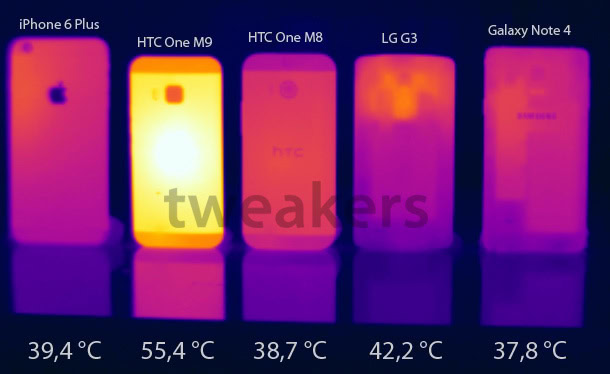Affiliate links on Android Authority may earn us a commission.Learn more.
(Update: post-update test) You may want to take that HTCOne M9 overheating report with a grain of salt
August 06, 2025
Update, March 23:Tweakersretestedthe One M9 after the device received an update last week. With the new software, the device heats up much less, as shown in this second thermal image.
It’s clear that on the original software, the device didn’t throttle when running the GFXBench benchmark, which caused it to overheat up to a whopping 55 degrees. What’s not clear is the reason: was it because of a bug, faulty configuration, or was it because throttling was disabled on purpose for that specific benchmark app?

AnandTechreported similar findings in itsOne M9 review. According to the respected website, the M9 now throttles under heavy load, which keeps heat in check but also affects performance. Here’s the relevant paragraph:
Original post, March 16

According to a report that surfaced earlier today from Dutch websiteTweakers, theHTC One M9running the popular benchmarking app GFXBench suffers from significant overheating issues. The website measured the One M9 along with various other high-end devices through a thermal camera, and reported each of the device’s temperatures. The One M9 became significantly hotter than all the other handsets, reaching up to extreme temperatures of 55.4 degrees Celsius, or just over 131 degrees Fahrenheit. In the image provided, no other handset even comes close to the One M9’s numbers. Take a look at the image below for more information.
The report states that these high temperatures were reached only when running the benchmark app. When playing games likeAsphalt 8andAssassin’s Creed: Pirates, the temperature stayed around 42.5 degrees Celsius.

The reasoning behind this overheating issue? Most notably, the One M9 is running on Qualcomm’s Snapdragon 810 processor, which hasn’t exactly gotten the best track record for its performance since its release. Samsungultimately decided to passon the processor with theGalaxy S6andS6 Edgehandsets, possibly due to overheating issues that the processor has been rumored to have.
[related_videos title=”Related Videos” align=”center” videosnum=”4″]

Comparatively, a few reports have also stated that the Snapdragon 810 doesn’t cause any overheating issues whatsoever.Anandtechtested the chip, and essentially said there wereno overheating issues to be found. Now, of course the processor will run differently when its performing in different handsets, so the claims against overheating issues in this instance with the One M9 don’t really stand up.
Before we get too far ahead of ourselves on the processor overheating issues, there are a few other variables that come in to play. For starters, the HTCOne M9 hasn’t been released yet. The handset in the test was not running even close to final software, which likely plays a big part in its overheating troubles. HTCrecently delayedthe launch of the One M9 in Taiwan to make some last minute software adjustments. While there’s no information on the software fixes it’s receiving, HTCis obviously still working on the handset to ensure the device’s stability.
The last thing we need to think about is the feasibility of this data. A metal device reaching temperatures of over 131 degrees could be dangerous to the human skin, and would likely be unbearable to hold for an extended period of time. By no means am I saying that the benchmark scores are inaccurate or that the temperature is wrong. But what I am saying is thatHTCprobablywouldn’t release a handset that overheats this much. They’ve been testing this device for months with the exact same chipset, and have presumably made adjustments where they see fit. Especially given the company’s financial standpoint in the mobile division, you’d think HTCwouldn’t overlook an issue this major.
The device we get in our hands in a few weeks will undoubtably be different from the deviceTweakersis using in their report. And although the website’s findings coincide with just about everything we’ve been hearing about the Snapdragon 810, we need to withhold our judgement until we actually get our hands on the consumer-ready devices.
Thank you for being part of our community. Read ourComment Policybefore posting.